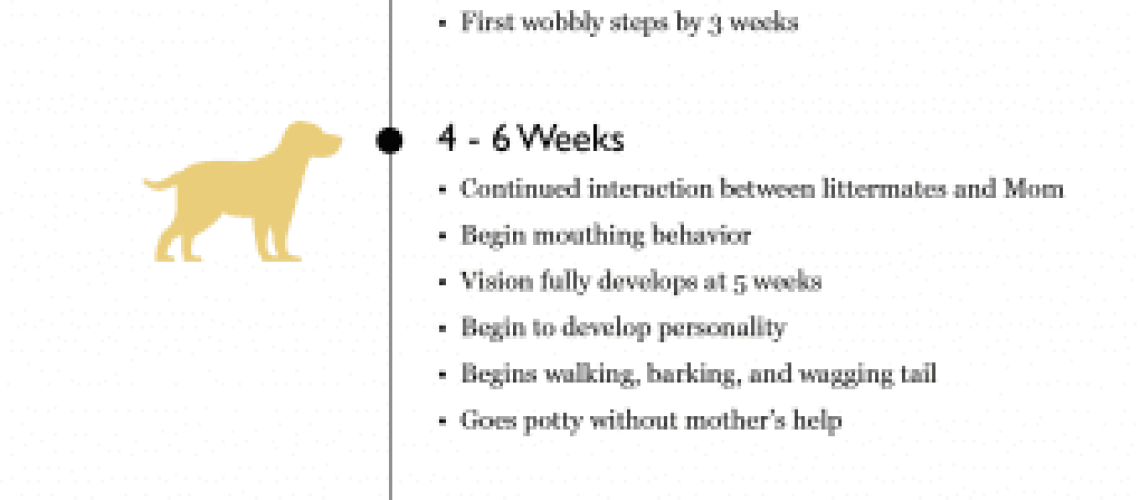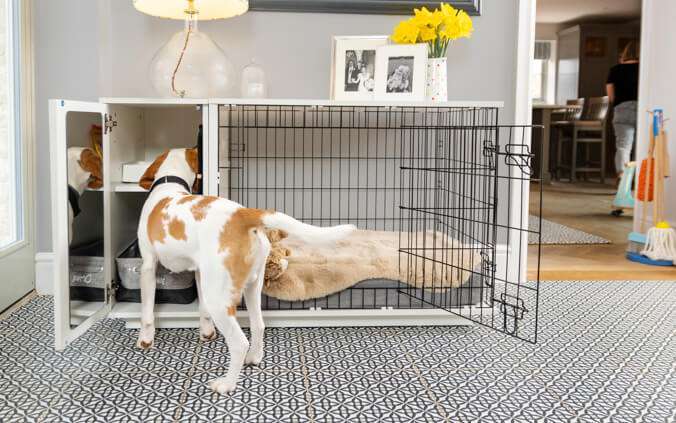During the critical period of 8 to 12 weeks, a puppy undergoes significant growth and development. This stage is crucial for their socialization, training, and overall well-being. Understanding the key milestones and challenges during this period can help ensure a healthy and happy start for your furry companion.
Key Takeaways:
- During the 8 to 12-week period, puppies experience rapid physical and cognitive development.
- Socialization is crucial during this stage as it helps puppies develop good behavior and adaptability towards people, animals, and various environments.
- Puppies should be introduced to basic obedience training, such as housebreaking and crate training, to establish a foundation for future learning.
- Proper nutrition is essential for their growth and development. Consult with a veterinarian to ensure they receive the appropriate diet for their age and breed.
- Puppies may start teething during this period, so provide them with appropriate chew toys to satisfy their chewing needs and prevent destructive behavior.
Important Milestones in a Puppy's Development from 8 to 12 Weeks
During the period of 8 to 12 weeks, puppies go through important developmental milestones that shape their growth and behavior. At this stage, their senses become more refined, and they start exploring the world around them with curiosity. They begin to develop their personalities and show signs of independence.
Puppies at this age start teething, which means they will chew on things to relieve discomfort. It is crucial to provide appropriate chew toys to help them satisfy this natural urge and protect your belongings from being damaged.
Additionally, puppies between 8 and 12 weeks old learn basic social skills by interacting with littermates and their mother. They start understanding hierarchy within their pack and learn how to communicate through body language and vocalization.
Physical Growth Progress of Puppies from 8 to 12 Weeks
From 8 to 12 weeks, puppies experience rapid physical growth. They gain weight quickly as they consume more food to support their growing bodies. Their bones also continue to develop, becoming stronger each day.
Their coordination improves during this stage as well. Puppies become more agile and start exploring their surroundings with increased mobility. They may begin running, jumping, and playing more energetically.
Puppies' teeth also continue to grow during this time. Their baby teeth fall out, making way for adult teeth that will serve them for the rest of their lives.
Key Socialization Experiences for Puppies at this Age
Socialization is crucial for puppies between 8 and 12 weeks old as it helps them become well-adjusted adults. During this period, it is important to expose them to various positive experiences that will shape their behavior towards people, animals, and different environments.
Introducing your puppy to new people, including children and adults of diverse backgrounds, helps them become comfortable with different individuals. It is important to ensure these interactions are positive and gentle to build trust and prevent fear or aggression towards strangers later in life.
Exposing puppies to other animals, such as friendly dogs or cats, can help them learn appropriate social skills and develop good manners when interacting with their furry counterparts. It is important to supervise these interactions to ensure safety for all involved.
Helping Puppies Develop Good Behavior Habits during this Stage
During the 8-12 week stage, it is crucial to establish good behavior habits in puppies. Consistency is key in training them to understand basic commands like sit, stay, and come. Positive reinforcement techniques such as treats and praise can be used to reward desired behaviors.
Puppies should also be taught proper house-training etiquette during this period. Establishing a routine for feeding and taking them outside for bathroom breaks helps them understand where they should relieve themselves. Accidents may still happen at this age, so patience and consistency are essential.
Setting boundaries for chewing behavior is vital during this stage as well. Providing appropriate chew toys while redirecting their attention away from furniture or shoes helps teach puppies what is acceptable to chew on.
Suitable Training Exercises for Puppies between 8 and 12 Weeks Old
Puppies between 8 and 12 weeks old have short attention spans but can still benefit from short training sessions focused on basic commands. Keep training sessions fun and engaging by using treats or toys as rewards.
Some suitable training exercises for puppies at this age include:
- Sit: Teach your puppy to sit on command by gently pushing their hindquarters down while saying the word "sit." Reward them with a treat and praise when they successfully sit.
- Stay: Begin by having your puppy sit, then take a step back and say "stay." Gradually increase the distance and duration of the stay before rewarding them for a successful stay.
- Come: Call your puppy's name followed by the command "come" in an excited tone. When they come to you, reward them with treats and praise.
Remember to keep training sessions short, frequent, and positive to avoid overwhelming your puppy.
The Importance of Exposing Puppies to Different Environments and Stimuli
Exposing puppies to different environments and stimuli is crucial for their mental and emotional development. It helps them become well-rounded dogs who can adapt to various situations without fear or anxiety.
Taking your puppy on walks in different locations exposes them to new sights, sounds, smells, and people. This helps desensitize them to potential triggers that may cause fear or aggression later in life.
Introducing puppies to various surfaces like grass, sand, or different types of flooring helps them develop confidence in walking on different textures. It also aids in their overall coordination and balance.
Common Health Concerns and Vaccinations for Puppies at this Age
Puppies between 8 and 12 weeks old require proper veterinary care to ensure their health and well-being. Common health concerns during this stage include:
- Parasites: Puppies are susceptible to parasites like fleas, ticks, worms, and mites. Regular check-ups with a veterinarian help identify any infestations early on.
- Vaccinations: Puppies need vaccinations against common diseases such as distemper, parvovirus, and rabies. These vaccinations protect them from potentially life-threatening illnesses.
- Dental Care: Puppies' teeth may require attention during this stage. Regular brushing and dental check-ups help maintain good oral health.
It is important to consult with a veterinarian to create a vaccination schedule and address any specific health concerns for your puppy.
Sleep Needs of Puppies from 8 to 12 Weeks and its Importance
Puppies between 8 and 12 weeks old need plenty of sleep for their growth and development. They typically sleep around 18-20 hours per day in short bursts throughout the day and night.
Sleep is crucial for puppies as it allows their bodies to rest and recharge. It aids in proper brain development, helps regulate their metabolism, and supports healthy immune function.
Creating a comfortable sleeping environment for your puppy with a cozy bed or crate can help them feel secure and promote better sleep habits. Establishing a consistent bedtime routine can also signal to your puppy that it's time to rest.
Nutrition and Proper Feeding for Growing Puppies
Nutrition plays a vital role in the growth and development of puppies between 8 and 12 weeks old. It is important to provide them with high-quality puppy food specifically formulated for their nutritional needs.
Feeding guidelines vary depending on the breed, size, and individual needs of the puppy. Typically, puppies should be fed three to four small meals throughout the day rather than one large meal.
Consulting with a veterinarian can help determine the appropriate portion sizes and feeding schedule for your specific puppy. It is important not to overfeed or underfeed them as both can have negative impacts on their health and growth.
Sure! Here's a catchy conclusion for the topic "Puppy Development From 8 to 12 Weeks" in a simple HTML markup table format:
```html
| Development Milestone | Description |
|---|---|
| Socialization | Puppies become more curious and start exploring their surroundings. |
Toilet Training
What are the hardest puppy weeks?By the time your puppy reaches 12-16 weeks or 3-4 months old, things start to become more intense. This age can be particularly difficult for many owners due to several reasons. Firstly, your puppy may still not be completely trained to use the bathroom, which can lead to feelings of frustration. What to expect from a 12 week old puppy?By this point, you should have already started crate training, potty training, and basic training for your puppy. You may also observe that your young dog's energy has significantly increased, requiring plenty of daily playtime and physical activity. Typically, dogs of this age are most active during the morning and evening times. Is it better to get a puppy at 8 weeks or 12 weeks?It is generally acceptable for larger breed puppies to be adopted at around 10 weeks old, but most breeders prefer to wait until they are 8 weeks old. This allows the puppies to start socializing and training with their new family sooner, which is beneficial during their impressionable stage. What should my 8 week old puppy be doing?At 8 weeks old, puppies typically sleep for about 18 to 22 hours each day, while the remaining time is dedicated to activities such as eating, playing, and bathroom breaks. At what age are puppies the naughtiest?At around 4-5 months old, puppies start to exhibit mischievous behavior. They have become familiar with your habits and have learned how to manipulate you, leading them to ignore your commands. Initially, this may appear amusing, but it becomes tiresome after a while. What is the naughtiest breed of puppy?The Labrador Retriever was named the "naughtiest" breed, earning it the top spot.
More Reads
Dr. Clara Bennett
Hello, fellow pet enthusiasts! I'm Dr. Clara Bennett, your go-to expert on all things pets. With a background in veterinary medicine and a passion for nutrition, I've spent years diving deep into the world of cats, dogs, birds, horses, and the products that keep them thriving. From the English countryside, I've witnessed the magic of animals and am here to share my knowledge, ensuring your pets receive the best care. Together, let's master the art of pet care!
All Posts »
Next Steps In Mastering Cat CareNext Steps In Mastering Dog CareJoin Our NewsletterSubscribe to receive our latest updates in your inbox! |
















